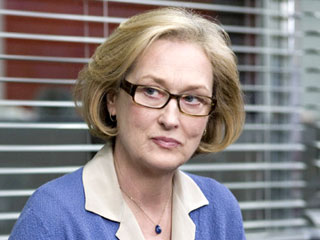From a Lofty Liberal Lectern: Lions for Lambs
by George Sax

Fox News’ bumptious, bullyragging Bill O’Reilly has been scolding Robert Redford over the actor-director’s new Afghanistan war film, Lions for Lambs. It’s not clear from his typically superheated and fatuous complaints that O’Reilly has actually seen the film, but is that much of a surprise?
“Dissent is fine,” he sternly warned Redford, but aiding the enemy crosses the line. The funny thing is, far from aiding that enemy—that would be Osama bin Laden and the Taliban, I assume—for its part, Redford’s film doesn’t seem entirely sure who, or what, the enemy is. It sometimes seems to be pointing toward one nearer to home, but the filmmakers don’t seem able to bring themselves to clarify this.
And while the movie equivocates, there are oppressively tedious scenes filled with earnest-sounding, preachy dialogue that must have been meant to dramatize a few of the critical questions of American life. But dramatic is a quality that Lions never comes close to achieving. It’s a ponderous creation of sentimental high-mindedness and stilted evasiveness.
Redford and screenwriter Matthew Michael Carnahan have employed a structure of three parallel story lines, not very effectively. Their film opens with the arrival of a veteran network television reporter (Meryl Streep) at the office of a Republican senator (Tom Cruise). The liberal, rather soul-weary journalist has been invited to be given an exclusive about a radical new kind of campaign in the war in Afghanistan, a campaign being kicked off even as they speak. First, though, the two have to debate and rehash the history of the wars in that country and Iraq.
Meanwhile, on a California university campus, a political science professor (Redford) is beginning an early-morning meeting with a once-promising student, now a cynical slacker, about his class absences. They spar over the relevance of education to pressing social and political problems and the prof tries to illustrate the virtue of personal commitment (the virtue of something, anyway; I wasn’t quite sure what) by recounting how two of his best former students enlisted in the Army. And as they speak, these two are in an assault helicopter over an Afghanistan mountain range, part of a special forces attack on the Islamist enemy, the very campaign the senator is just then revealing to the skeptical reporter.
This scheme is heavy-handed and it’s been gracelessly executed. Redford just cuts back and forth between Washington and the prof’s office, trying to use the faraway unfolding attack as a striking counterpoint to these static scenes set back in the States. It’s doubtful that they could salvage the proceedings anyway, but in fact, Redford’s war sequences are so melodramatically shameless and unconvincing, they’re embarrassing.
Carnahan has said he was moved to write this movie when he found himself feeling guilty about enjoying a televised football game while important values and institutions were under siege. Maybe that’s a creditable impulse, but the movie fairly reeks of the solemn, insulated liberal didacticism of the abundantly privileged.
Virtually none of it works, but the campus scenes were an especially big mistake. The ethical tug-of-war in the prof’s office plays out as vacuously silly. The rest of the movie doesn’t suggest anyone importantly involved had a rudimentary purchase on the operations of politics and journalism. Why would a right-wing senator be divulging a new military campaign to only one unsympathetic reporter? What’s the Pentagon’s extensive information management apparatus been doing?
Carnahan’s script is an ill-premised mess, but the film’s ponderous, self-regarding tone is largely attributable to Redford. And it has some continuity with his long career. His performances have most often suggested a star’s need for self-protection of his dignity and distancing glamor. Unlike, say, Cary Grant or Redford’s pal Paul Newman, he’s never seemed comfortable communicating a sense of subversive fun or surprise, the kind of performances that can engage an audience viscerally. This probably has something to do with the lack of comedies in his resume.
His direction has been careful, measured and too often over-serious. And here, one of his relative strengths as a director, the care, sympathy and effectiveness he’s shown with his actors, is missing. The performances are stiff and the actors don’t connect with one another. And he’s allowed Cruise to give one of the worst of his career, brightly declamatory and over-emphatic.
On the evidence, Redford and Carnahan must have been trying to incite audiences’ recognition that there are political challenges to our liberties and safety and that our moral vitality is being sapped. Perhaps they had in mind something like Walt Kelly’s old message in his Pogo strips: “We have met the enemy and it is us.”
Whatever the merits of that sentiment, it’s baldly presumptuous given their film’s muddled, hectoring, but annoyingly unconcrete tenor. It winds up letting the moral issues slide away in solemn ambiguity. Lions doesn’t convey a sense that the filmmakers understand the momentous problems they’re warning us about.
|
Issue Navigation> Issue Index > v6n45: Who Really Killed JFK? (11/8/07) > From a Lofty Liberal Lectern: Lions for Lambs This Week's Issue • Artvoice Daily • Artvoice TV • Events Calendar • Classifieds |









 Current Issue
Current Issue